As I mentioned on the title; I have a vector which stores a bunch of words(around 2000 words) and in a part of the project it's expected from me that take a random word from that vector and display it. (the project is word finding-like) I have two classes that one of is main, and other is for taking word from vector. I attached the codes below. Something must have escaped my notice, but I can't get what it is somehow.
#include <iostream>
#include <vector>//must be
#include <string>//must be
#include "Dictionary.h"
#include <set>
using namespace std;
int main() //main
{
vector<string> words;
Dictionary dict(words);
words = dict.setElements();
string randomWord = dict.getaRandomWord(words); //this line is for generate a random word
cout << randomWord;
return 0;
}
class Dictionary //dictionary class
{
public:
Dictionary(::vector<string> a) {
//getWordsFromFile() = a;
}
/* public :vector<string> getWordsFromFile() {
vector<string> words;
ifstream inFile;
string tmp;
inFile.open("words.txt");
while (!inFile.eof()) {
inFile >> tmp;
words.push_back(tmp);
}
return words;
}*/
vector<string> setElements() {
// Declaring Vector of String type
set<string> wordsSet;
string buffer;
vector<string> wordsVector;
ifstream inFile;
string tmp;
inFile.open("words.txt");
while (!inFile.eof()) {
inFile >> buffer;
wordsSet.insert(buffer);
}
for (set<string>::iterator it = wordsSet.begin(); it != wordsSet.end(); ++it) {
wordsVector.push_back(*it);
}
/*for (int i = 0; i < wordsVector.size(); i++) {
cout << wordsVector.at(i)<<endl; //its for displaying the elements of the vector
}*/
return wordsVector;
}
string getaRandomWord(vector<string> a) { //function that has supposed to be generate a random word
vector<string> currentVector = a;
string randomWord;
int randomNumber = rand() % currentVector.size();
randomWord = currentVector.at(randomNumber);
return randomWord;
}
};
takes aging everytime
EDIT: I placed the seed inside the constructor but leaved other code untouched.So, only changing I made is adding a line of srand(time(nullptr)); inside the Dictionary cons.
class Dictionary
{
public:
Dictionary(::vector<string> a) {
//getWordsFromFile() = a;
srand(time(nullptr));
.
.
.
}
And the output was like thumb-trash-truly... There is still an alphabetical order.
